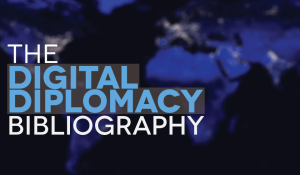Books on Digital Diplomacy
ABOUT: The evolution of modern technology has allowed digital democracy and e-governance to transform traditional ideas of political dialogue and accountability. This book brings together a detailed examination of the new ideas on electronic citizenship, electronic democracy, e-governance, and digital legitimacy. Combining theory with the study of law and of matters of public policy, this is an essential read for academic and legal scholars, researchers, and practitioners.
Chopra, S. (2014). The Big Connect: Politics in the Age of Social Media. Random House India.
ABOUT: Are digital means of communication better than traditional bhaashans and processions? Will a social media revolution coerce armchair opinion makers to head to poll booths? Twitter, Facebook, and LinkedIn are changing the way the denizens of the world, and more specifically youth of this country, communicate and connect. In this book, Shaili Chopra traces the advent of social media in India and how politics and lobbying have now shifted to the virtual floor. She argues that though a post, a pin, or a tweet may not translate into a vote, it can definitely influence it. With comparisons to the Obama campaign of 2008 and 2012 and analysis of the social media campaigns of political bigwigs like Narendra Modi, Rahul Gandhi, and Arvind Kejriwal—the book discusses the role of a digital community in Indian politics.
Costigan, S. S. (2012). Cyberspaces and Global Affairs. Burlington, VT: Ashgate.
ABOUT: From the "Facebook" revolutions in the Arab world to the use of social networking in the aftermath of disasters in Japan and Haiti, to the spread of mobile telephony throughout the developing world, these developments are part of how information and communication technologies are altering global affairs. With the rise of the social media, scholars and practitioners of international affairs are adapting to this new information space across a wide scale of issue areas. In conflict resolution, dialogues and communication are taking the form of open social networks, while in the legal realm, where cyberspace is largely lawless space, states are stepping up policing efforts to combat online criminality and hackers are finding new ways around increasingly sophisticated censorship. The essays and topical cases in this book explore such issues as networks and networked thinking, information ownership, censorship, neutrality, cyberwars, humanitarian needs, terrorism, privacy and rebellion, giving a comprehensive overview of the core issues in the field, complemented by real world examples.
ABOUT: This working paper series intends to illuminate this narrative by delving further into the trends in international affairs that have been accelerated or otherwise augmented by the information revolution. Because this task could easily prove unmanageable, the series will examine in particular two separate but linked phenomena enhanced by the information age: heightened transparency and increased volatility.
ABOUT: In light of the events of 2011, this book examines how diplomacy has evolved as media have gradually reduced the time available to policy makers. It analyzes the workings of real-time diplomacy and the opportunities for media-centered diplomacy programs that bypass governments and directly engage foreign citizens.
ABOUT: Inspired by Allan Gotlieb's capacity to reshape diplomacy for the times, the contributors to this volume grapple with the challenges of a digital age where information is everywhere and confidentiality is almost nowhere. With an introductory essay by renowned political scholar, writer, and commentator, Janice Gross Stein, the work is divided into 4 sections: Diplomacy with the United States in the Era of Wikileaks; The Professional Diplomat on Facebook; Personal Diplomacy in the Age of Twitter; and Where is Headquarters? Contributors include professional diplomats, award-winning journalist Andrew Cohen, former Globe and Mail editor and author Ed Greenspon, and Allan Gotlieb's wife and partner in 'social diplomacy', Sondra Gotlieb.
ABOUT: Over the past decade, scholars, practitioners, and leading diplomats have forcefully argued for the need to move beyond one-way, mass-media-driven campaigns and develop more relational strategies. In the coming years, as the range of public diplomacy actors grows, the issues become more complexly intertwined, and the use of social media proliferates, the focus on relations will intensify along with the demands for more sophisticated strategies. These changes in the international arena call for a connective mindshift: a shift from information control and dominance to skilled relationship management. This book is an essential resource to students and practitioners interested on how to build relationships and transform them into more elaborate network structures through public communication. It will challenge you to push the boundaries of what you think are the mechanisms, benefits, and potential issues raised by a relational approach to public diplomacy.
To download the full Digital Diplomacy Bibliography, click here.
Issue Contents
Most Read CPD Blogs
-
January 29
-
January 20
-
January 28
-
January 2
-
January 8
Visit CPD's Online Library
Explore CPD's vast online database featuring the latest books, articles, speeches and information on international organizations dedicated to public diplomacy.









Add comment